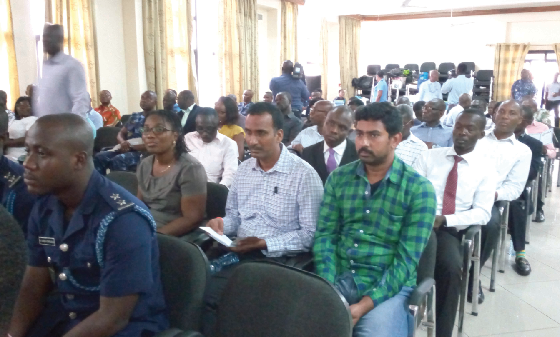
Review licensing of private bonded warehouse operation
An official of the Customs Division of the Ghana Revenue Authority (GRA), Mrs Cecelia Kobblah, has called for a review of the requirements for the registration and licensing of private bonded warehouse operators.
Advertisement
That, according to her, was because it had come to the attention of the GRA that some private warehouse operators were engaging in some illegal activities.
Speaking at a tax education forum in Accra, organised by the Accra Collection Unit of the Customs Division of the GRA for operators of private warehouses, manufacturers, importers and exporters, Mrs Kobblah, who is the Chief Revenue Officer in charge of warehousing and systems at the Accra Collection Unit of the Customs Division, GRA, said some private operators removed goods in their bonded warehouses without authority.
She said anyone who assisted in the clearance of goods from a bonded warehouse without the supervision of an officially assigned customs official had breached the law.
The forum was themed: “Promoting a healthy environment for national development: the role of customs and stakeholders.”
What is a warehouse?
Warehousing, she explained, was a Customs regime by which imported goods were stored under Customs control in a government or private-bonded warehouse, without payment of import duty and other taxes on goods at the entry point, until the goods are entered for home consumption.
Mrs Kobblah said there were two types of warehouses; a government and a private-bonded warehouse.
While the government warehouses were owned by the state, she said a private warehouse was a building or place appointed and licensed by the Commissioner-General of the GRA for the storage of goods.
Traders have three months to store perishable goods, 12 months for general goods and two years for raw materials.
In addition to obtaining a licence to operate a private warehouse, Mrs Kobblah said the operator must satisfy some structural requirement rules such as ensuring that the building was safe, secure, waterproof and rattoon.
She recommended a speedy enforcement of sanctions and prosecution and the institution of a reward system for operators who complied with the law.
Mrs Kobblah asked the GRA to employ a robust risk management tool in assessing performance of operators and also train and sensitise officers and operators to improve operations.
GRA modernisation
The Deputy Commissioner of the Medium Taxpayer Office (MTO), Mr Alex Asamoah-Bonti, said the forum was part of the GRA’s modernisation process and was aimed at building and improving compliance, reducing the incidence of corruption and revenue leakage and to facilitate trade and investment.
Customs, he said, was widely recognised for the key economic role it played in the management of the international supply chain to maintain streams of revenue and trade facilitation, while generating valuable statistics for policy making.
History
In a welcome address, the Sector Commander of the Accra Collection Unit of the Customs Division of the GRA, Ms Christiana Akoto-Bamfo, gave a brief history about the unit.
She said the unit, then the James Town Office, was inaugurated in 1926 during the colonial era of the Dutch and Portuguese for the small ports along the coast line of the country.
When the British took over, they built the James Fort in 1673 after which a couple of warehouses were built in the James Town community for the storage of merchandise.
However, following the inauguration of the Tema Harbour in 1962, all imports were directed from the James Town Port to the Tema Harbour.



